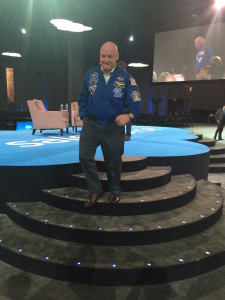
Get your FREE 30-day trial.
Please complete all fields.
Captain Scott Kelly wasn't a very good student when he was young. He freely admits, he'd probably be diagnosed with ADD now.
When he was a teenager, the man who has spent more time in space than any other American would have appeared to everyone else as just some below-average student destined to live a common life here on Earth. But when Kelly picked up a copy of Tom Wolfe's The Right Stuff, his life took on a new trajectory.

"I saw some of those traits in those early astronauts that I recognized in myself," he said during a keynote interview on the last day of Connection 2016. "I just needed the inspiration."
Kelly began a plan to improve his life by small steps, each one pointed at his goal of becoming an astronaut.
While most people would easily become overwhelmed by the task ahead, that wasn't the case for Kelly. "Each small step along the way was manageable for me," he explained.
His savant-like memory helped. Reciting operating procedures for the spacecraft while on stage with Salesforce Marketing Cloud CEO Scott McCorkle, it's obvious that Kelly has an unmatched gift for focus.
That ability to focus on the immediate tasks before him served him well on his first mission to space, repairing the Hubble Telescope in a "science emergency." Going to space is dangerous, "probably more dangerous than most people think," he said.
When you're strapped to a rocket leaving Earth's orbit, "there's nothing more important than what you're doing right now because if I throw this switch the wrong way, I could blow this up," he said.
When the spacecraft takes off it might appear like a slow and calculated task, Kelly said. But, "When you're inside it's not slow. You know you're going somewhere, but you also know you're not coming back to Florida."
Hearing Kelly describe space flight is to understand what it means to be fully and completely in the moment. He doesn't necessarily describe it as mindfulness, but it's the stuff that would make Deepak Chopra envious.
Nothing illustrates this point more than Kelly describing his scariest day aboard the Space Station. He got a message from NASA that they were securing the, typically public, communication channel.
The only other time Kelly witnessed public communication going dark was when NASA informed him that his sister-in-law, Arizona Representative Gabby Giffords had been shot. This time, NASA called to tell the crew that a massive piece of space garbage was barreling toward the Space Station at 35,000mph and there wasn't time to move out of the way.
Per orders, Kelly began securing all the hatches. After two hours of work, he went to the Russian side of the Space Station only to find his comrades calmly eating lunch.
After all, if they were hit by space debris moving at 35,000 mph, it was likely they would be disintegrated upon impact. So, why die hungry?
While in space for 344 days Kelly spent his time mostly the same--even wearing the same clothes. Returning to this planet, he's embracing a more simplistic life, joking that he's only worn his pants for a week.
Orbiting 200 miles above Earth at 17,500 mph puts a few things into perspective. The blue of the oceans, for example, "Is the most beautiful thing I've ever seen."
After seeing the expanse of space, Kelly also believes "There has to be life out there."
Perhaps most troubling, Kelly describes large swaths of China and India completely covered by smog. Unlike most places, it's impossible to see the lights from the cities below.
"If you were to ask a kid in China what color the sky is," he said, "I think he'd say grey."
While Kelly doesn't pretend to know the answers to global warming, he believes continued scientific research as part of NASA's mission will create continued and lasting benefits to the cause.
He notes that the first trip to space helped lay the groundwork for the computers we take for granted today. Kelly believes that we will eventually go to Mars because "We are inherently explorers. It's part of our DNA."
Kelly's experience has laid the foundation for that trip to Mars. His bravery means that we can continue to reach beyond the stars and achieve impossible tasks that make our world better.
It started as a series of small steps but was a trip that made a giant leap for all humanity.